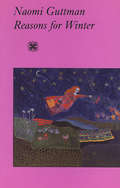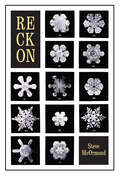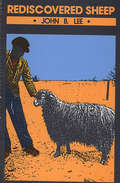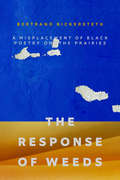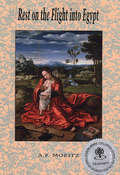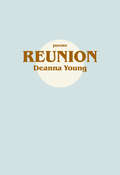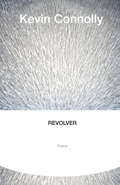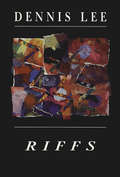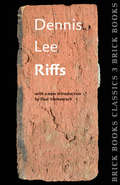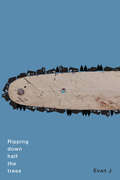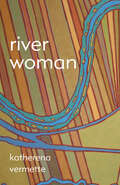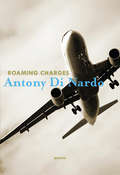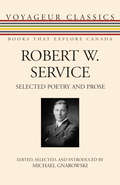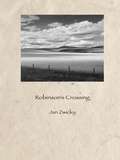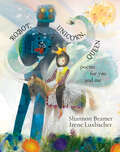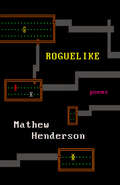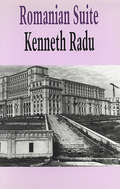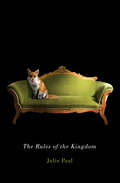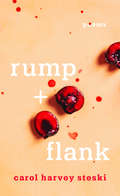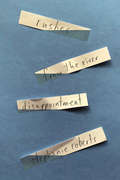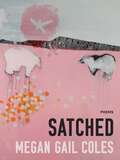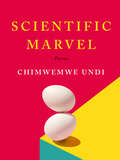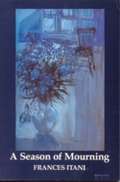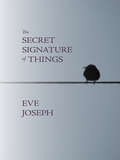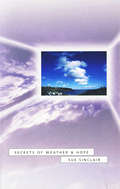- Table View
- List View
Reasons for Winter
by Naomi GuttmanWinner of the 1992 A.M. Klein Prize for Poetry (QSPELL, now the Quebec Writers Federation) and shortlisted for the 1991 Pat Lowther Award Naomi Guttman's first collection of poems marks the appearance of a deeply emotional, highly intelligent new voice. Its theme is intimacy -- ours, especially women's, experience of intimacy in many forms, how it marks us, how we long for it, the ways in which it is both our fulfilment and our undoing. The personae range from children to old men and women, jailbirds to schoolgirls; the language is chosen without ever becoming deliberate, precise but always musical. These are poems from and of the heart, chastened by experience, taut with craft.
Reckon
by Steve McOrmondAnxious, twitchy, urgent poems—a collection that’s at once sardonic and “chronically wishful.”
Rediscovered Sheep
by John B. LeeRediscovered Sheep takes its origin generations ago when an ancestor of John B. Lee began to raise Lincoln sheep in Ontario. John B. may never take up his inheritance as Master of the Flock, but his understanding of sheep husbandry is woven into the woolly fabric of his work. The first poems in Rediscovered Sheep are about real modern-day shepherds and actual sheep. Then the sheep get loose. They spill out into human roles -- policeman, guest speaker, ballerina -- which they occupy exuberantly and sometimes with a disquieting naturalness. Rediscovered Sheep is a realistic/fantasy pastoral for contemporary times, with the true pastoral’s wise innocence that never forgets the wolf.
The Response of Weeds: A Misplacement of Black Poetry on the Prairies (Crow Said Poetry)
by Bertrand BickerstethBertrand Bickersteth’s debut poetry collection explores what it means to be Black and Albertan through a variety of prisms: historical, biographical, and essentially, geographical. The Response of Weeds offers a much-needed window on often overlooked contributions to the province’s character and provides personal perspectives on the question of Black identity on the prairies. Through these rousing and evocative poems, Bickersteth uses language to call up the contours of the land itself, land that is at once mesmerizing as it is dismissively effacing. Such is Black identity here on this paradoxical land, too.
Rest on the Flight into Egypt
by A. F. MoritzShortlisted for the 2000 Governor General's Award for Poetry From the outskirts of the fevered empire, and the embers that were its heart, Moritz sings us to our selves -- our failures, our cruelties, our stupidities, and beauty which even now astonishes and leaves us breathless. Genuine political poetry is immensely difficult. Moritz succeeds, not because his list of atrocities is longer or more shocking, but because his vision is underwritten -- not whitewashed – by an ecstatic lyricism that knows evanescence is the only enduring truth.
Reunion
by Deanna YoungPoems that unfold like liturgy, confronting old violence with a trembling, dignified restraint.
Revolver
by Kevin ConnollyThe highly anticipated follow-up to the award-winning poetry collection Drift, Kevin Connolly's Revolver is a daring marriage of brilliant technical skill and explosive imagination. Each of the poems in this extraordinary collection is written in a different vocal register -- revolving through poetic voices with precise control and sharp wit. Connolly reveals himself to be one of the few poets in Canada who can pull off such a high wire act, and make it both thrilling and meaningful.
Riffs
by Dennis LeeRiffs is the story of a passionate love affair, told in vintage Lee style -- with whoops, deep chords, and headlong improvisational arcs. We hear Bach, Bo Diddley, Bird; the news is heartache and being. Celebratory, catastrophic, the poem tracks ways in which eros and our lives are made mutually accountable. Riffs is a landmark achievement from the poet of Civil Elegies and The Gods. Published in 1993, this was Dennis Lee's first book of adult poetry in 14 years.
Riffs
by Dennis LeeDeluxe redesign of an aching solo situated at the mid-point of a long, melodious career. On the occasion of the press's 40th anniversary, Brick Books is proud to present the third of six new editions of classic books from our back catalogue. This edition of Riffs features a new introduction by the poet Paul Vermeersch, a reprint of an extended interview with Dennis Lee about the book, and a new cover and design by the renowned typographer Robert Bringhurst. Riffs is a story of a passionate love affair, told in vintage Lee style—with whoops, deep chords, and headlong improvisational arcs. We hear Bach, Bo Diddley, Bird; the news is heartache and being. Celebratory, claustrophobic, the poem tracks ways in which eros and our lives are made mutually accountable.
Ripping down half the trees (Hugh MacLennan Poetry Series #60)
by Evan JSome poems can live without souls / but mine remain ghastly fools flicking / uncomfortable narratives like / cigarette butts during class change.One out of every twenty students in the adult education classes Evan J teaches in Sioux Lookout, Ontario, dies every year; the surviving students are often afflicted by severe racism, poverty, addictions, and violence. Ripping down half the trees engages with these struggles, offering a catalogue of experiences specific to the remote regions of Canada.Tearing down the façade of Canadian justice and equality to expose the racism, colonialism, sexism, prejudicial capitalism, and ableism at the nation's core, these are poems about cruelty, both the obvious and the ambient. They are unflinching in their sociopolitical criticism, upset by unchanging systemic oppressions, unable to overlook the threat of the author's white skin, unwilling to forget Justin Trudeau in blackface. And while they acknowledge the limits of the author's privileged perspective, they are never willing to let the perpetrating structures of this cruelty go unchecked.But these poems also let stand the shelterwood, the upstanding actions of individuals, the totems of hope. They work as coping strategies, as therapy, as empathy, offering a glimpse of optimism and a space for discourse. These are poems that listen.
river woman
by Katherena VermetteGovernor General’s Award–winning Métis poet and acclaimed novelist Katherena Vermette’s second collection, river woman, explores her relationship to nature — its destructive power and beauty, its timelessness, and its place in human history.Award-winning Métis poet and novelist Katherena Vermette’s second book of poetry, river woman, examines and celebrates love as decolonial action. Here love is defined as a force of reclamation and repair in times of trauma, and trauma is understood to exist within all times. The poems are grounded in what feels like an eternal present, documenting moments of clarity that lift the speaker (and reader) out of the illusion of linear experience. This is what we mean when we describe a work of art as being timeless.Like the river they speak to, these poems return again and again to the same source in search of new ways to reconstruct what has been lost. Vermette suggests that it’s through language and the body ― particularly through language as it lives inside the body ― that a fragmented self might resurface as once again whole. This idea of breaking apart and coming back together is woven throughout the collection as the speaker contemplates the ongoing negotiation between the city, the land, and the water, and as she finds herself falling into trust with the ones she loves.Vermette honours the river as a woman ― her destructive power and beauty, her endurance, and her stories. These poems sing from a place where “words / transcend ceremony / into everyday” and “nothing / is inanimate.”
Roaming Charges
by Antony Di NardoA turbulent, celebratory flight from an accomplished witness and journeyman. Antony Di Nardo's third collection of poems occupies the air between Canada and Lebanon, viewer and painting, victim and triggerman, reader and page. Blending a bohemian ebullience with a reporter's obligation to witness, the poems in Roaming Charges are a heady and celebratory bouquet of jet fuel, camaraderie and muezzin music. They look long and hard at their subjects, but also speak of the trails those subjects leave across the skies.
Robert W. Service: Selected Poetry and Prose
by Robert W. Service Michael GnarowskiThe writing of Robert W. Service is mostly known through his poems and ballads. Immortalized by his two iconic ballads, "The Cremation of Sam McGee" and "The Shooting of Dan McGrew," he has entered the world’s imagination as the Bard of the Yukon. But Service was much more than a chronicler of the Great North.A traveller and adventurer who tried his hand at many occupations, Service left a fascinating set of impressions: the successful literary life in the course of which he produced everything from poems and ballads to fictional romance to thrillers and how to stave off the dreary process of aging.Robert W. Service is a fresh selection of the most interesting and significant works of the author with a biographical introduction and a select bibliography of additional readings.
Robinson's Crossing
by Jan ZwickyThe poems in this book arise from Robinson’s Crossing — the place where the railway ends and European settlers arriving in northern Alberta had to cross the Pembina River and advance by wagon or on foot. How have we crossed into this country, with what violence and what blind love? Robinson’s Crossing enacts the pause at the frontier, where we reflect on the realities of colonial experience, but also on the nature of living here — on historical dwelling itself. In long meditative narratives and shorter probing lyrics, Jan Zwicky shows us-as she has in her celebrated Lyric Philosophy and the Governor General’s award-winning Songs for Relinquishing the Earth — how music means and meaning is musical.
Robot, Unicorn, Queen
by Shannon BramerA collection of poems that explore childhood experiences—from the whimsical to the poignant—by Shannon Bramer, with magical art by Irene Luxbacher. Shannon Bramer’s follow-up to her much-loved poetry book Climbing Shadows is a collection of poems that explore a range of childhood experiences. Many poems reveal what it feels like to be a child—to pretend and dream and play with abandon, as well as to hurt and regret and feel sorrowful. The poems are varied in form, and while some are simple and direct, others invite children to see the potential for play and discovery in words and language. In the opening poem a child welcomes their newborn sibling, while the last poem is a surreal lullaby. In between we find poems about a child who listens to a toad, who feels left out, who loves the beach, who must practice piano, who accidentally breaks their mother’s favorite plate, who doesn’t want to eat their lunch, whose pet budgies have died, who visits their father on weekends, and more. Readers young and old will see themselves in these beautifully illustrated poems—a collection full of laughter, tears and wonder. Key Text Features author’s note Illustrations poems table of contents writing inspiration Correlates to the Common Core State Standards in English Language Arts: CCSS.ELA-LITERACY.RL.4.2 Determine a theme of a story, drama, or poem from details in the text; summarize the text.
Roguelike
by Mathew HendersonMathew Henderson explores with remarkable insight the unique logics of video games and addiction in his much-anticipated sophomore poetry collection.Mathew Henderson’s Roguelike, the much-anticipated follow-up to his acclaimed 2012 debut The Lease, melds the unique online vocabulary, culture, and logic of video games with family and addiction narratives, specifically the poet’s relationship with his mother and her struggle with narcotics. The resulting poems are arresting and fresh, mining game mythology, fantasy, and family history, while exploring the rich connection between video gaming and notions of addiction, repetition, storytelling, and escapism.Though the poems are largely narrative, ultimately Roguelike is less about stories themselves than it is about the psychological and emotional forces that define how and why we make them — how we’re all moved to shape the disparate and seemingly unconnected events of our lives into something meaningful, to make sense of the past and the present through storytelling.
Romanian Suite
by Kenneth RaduIn linked poems of great individual power, Kenneth Radu addresses the matter of Romania, the country of his ancestors, summoning figures from myth, distant and recent history, and the arts. The cast of characters includes Dracula, Prince Vlad the Impaler, and the devil -- all related to Ceausescu himself -- as well as an immigrant and his wife, and the great Romanian pianists Dinu Lipatti and Radu Lupu, and a bride who courageously battles the devil for control of her wedding. These interweave with a narrator in the present -- a gardener-pianist -- to create a long poem that is both an exorcism and a celebration, an enactment of the human capacity to survive and regenerate spiritually.
Rules of the Kingdom (Hugh MacLennan Poetry Series #39)
by Julie PaulA lapsed religion still emits / faint signals; God, / in his satellite dish, / groans / moving on. To seek belonging, to strain against the familiar – these are the polarities many of us live between, feeling the pull of each desire. Offering a particular history, an intimate vantage point from within the various kingdoms we inhabit, Julie Paul’s The Rules of the Kingdom is an exploration of this struggle on a personal level and a universal one. Broken into five sections, the book examines the human struggle to find meaning, comfort, and a sense of home. In “Settlers’ Descendant Reclaims the Past,” the poems consider rural life, both the specific and the collective, including a village’s destruction by fire. In “Weight of the Word” the focus turns to family of origin, religion, and rites of passage. Poems take a familial tack again in “Cleavage,” wherein Paul dives into the waters of motherhood, and they drift into further intimacy in “The World’s Smallest Republic,” a series of poems about sex, love, and marriage. Finally, the poems in the fifth section, “Next Time the World Will Burn,” explore our place in the twenty-first century and offer some idiosyncratic suggestions on how to live. At turns humorous, playful, contemplative, and coy, the poems in The Rules of the Kingdom question the vagaries of faith and family but ultimately celebrate life and love.
rump + flank (Crow Said Poetry)
by Carol Harvey SteskiCarol Harvey Steski’s tenacious and unapologetic debut, rump + flank, explores the body in nature’s many incarnations: human, animal, plant, microbe, even chemical. The result is a fantastical poetic work that sheds light on what bodies—especially female ones—endure, probing the full range of experiences from pleasure and hope to deep loss and trauma.These poems are piercingly humorous, sexy, and peppered with startling absurdities, but are grounded by an undercurrent of nostalgia (and a soupçon of feminist rage): mercury reproduces like funhouse mirrors, oysters are whole notes dropped into eternal song, cancer is a surly character taking and discarding lovers, a domestic chore turns dark as a mother channels her inner Lady Macbeth. Lush imagery melds with organic rhythms to spawn a visceral experience, a tendon-and-muscle-driven engine that readers can feel racing within their own bodies.
rushes from the river disappointment (Hugh MacLennan Poetry Series #53)
by stephanie roberts"those of us who've seen miracles know how to ask. / if you've asked, do you love me, i almost certainly / don't love you." This meditative, musically attentive collection explores the confounding nature of intimate relationships. stephanie roberts's poetic expression is often irreverent, unapologetic, and infused with humour that can take surprisingly grave turns. rushes from the river disappointment traverses city, country, and fantasy using nature as artery through the emotional landscape. As they wrestle to come to terms with the effects of uncertainty and grief on hope and belief, these diverse field notes are interspersed with the fabulous: a polar bear and owl engage in flirtation, a time traveller appears on a lake, an erotic scene takes place on a train, and we confront "people capable of eating popcorn at the movie of your agony." roberts's language is dense with images and sometimes acrobatic. In poems that affirm love and desire as treasures fought for more than just felt, rushes from the river disappointment turns an unblinking gaze on the failures of courage that distance us from love.
Satched
by Megan Gail ColesNamed after a local word meaning “soaked through” or “weighed down,” Scotiabank Giller Prize finalist Megan Gail Coles’s debut poetry collection, Satched, is a vivid portrait of intergenerational trauma, ecological grief, and late-stage capitalism from the perspective of a woman of rural-remote, Northern, working class, mixed ancestry. Honest, penetrating, and often darkly comic, these poems explore the extraordinary will it requires to stay alive in the face of economic precariousness, growing inequality, and prevailing dissatisfaction. With a fierce dedication to place, the collection explores the conflict inherent to individualistic priorities and collective needs present in a hyper-commodified Newfoundland and Labrador. Satched demands compassionate advocacy for all as it resolutely strives for clarity and acceptance while celebrating the momentary glimpses of joy in the path toward shared values and resilience.
Scientific Marvel: Poems
by Chimwemwe UndiMarked by rhythmic drive, humour, and surprise, Undi’s poems consider what is left out from the history and ongoing realities of Winnipeg, Manitoba. Firmly grounded in the local, the arresting poems in Chimwemwe Undi’s debut collection, Scientific Marvel, are preoccupied with Winnipeg in the way a Winnipegger is preoccupied with Winnipeg, the way a poet might be preoccupied with herself: through history and immigration; race and gender; anxieties and observation. Marked by rhythmic drive, humour and surprise, Undi’s poems consider what is left out from the history and ongoing realities of Winnipeg, Manitoba, and the west. Taking its title from a beauty school in downtown Winnipeg that closed in 2017 after nearly 100 years of operation, Scientific Marvel approaches the prairies from the point of view of a person who is often erased from the prairies’ idea of itself. “I mean my country the way / my country means my country / and what else is there to say? / I am bad and brown / and trying. Nothing here / belongs to me or could / or ever will.” This is poetry that touches on challenging topics—from queerness and colonialism to racism, climate rage, and decolonization, while never straying far from specific lived experience, the so-called ‘smaller’ questions: about self, art, dance parties and pop culture, relationships and love.
A Season of Mourning
by Frances ItaniFrances Itani's third book of poetry consists of two deeply moving elegiac sequences commemorating the deaths of a sister and friend. In chaste and determinedly unsentimental language, Itani takes us through the crises all must face, ignoring none of their turbulence or anguish, yet leaving us with a renewed sense of humanity. In these two sequences, she accomplishes inspiring acts of homage and remembrance.
The Secret Signature of Things
by Eve JosephMuch of this poised and luminous book is rooted in an idea of epiphany, an aesthetic of everyday incarnation; not the sudden and profound manifestation of essence or meaning, but the smaller steps taken toward it. The moments in which, as Joyce writes, “the soul of the commonest object…seems to us radiant.” If epiphanies are for theologians, perhaps the little steps towards them are for poets like Eve Joseph, and for all of us who attempt to see beyond the names we give things to the names they give themselves.
Secrets of Weather and Hope
by Sue SinclairShortlisted for the 2002 Gerald Lampert Award Sue Sinclair's poems speak from that precise place where our perception of the world and our capacity for language meet and embrace, where our sense of experience goes to get sharpened and refreshed. That experience might involve the inner lives of clouds, the flourishing and passing of a tulip, the evocative scent of wolf willow, or the intricate arts of Bach and Virginia Woolf. These poems are deft, musical, and quick in the moment, alive to the sensuous surface and the meditative depth, their antennae fully extended.
